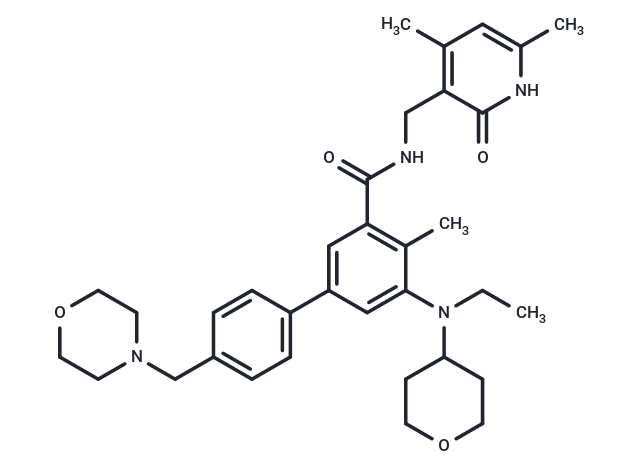 您的购物车当前为空
您的购物车当前为空
Tazemetostat
一键复制产品信息别名 EPZ6438, E-7438
Tazemetostat (EPZ6438) 是一种组蛋白甲基转移酶 EZH2 抑制剂 (IC50=11 nM),具有口服活性、选择性和 SAM 竞争性。Tazemetostat 具有抗肿瘤活性,可以用于治疗上皮样肉瘤/滤泡性淋巴瘤。

Tazemetostat
一键复制产品信息Tazemetostat (EPZ6438) 是一种组蛋白甲基转移酶 EZH2 抑制剂 (IC50=11 nM),具有口服活性、选择性和 SAM 竞争性。Tazemetostat 具有抗肿瘤活性,可以用于治疗上皮样肉瘤/滤泡性淋巴瘤。
| 规格 | 价格 | 库存 | 数量 |
|---|---|---|---|
| 1 mg | ¥ 160 | 现货 | |
| 5 mg | ¥ 356 | 现货 | |
| 10 mg | ¥ 546 | 现货 | |
| 25 mg | ¥ 866 | 现货 | |
| 50 mg | ¥ 1,260 | 现货 | |
| 100 mg | ¥ 2,160 | 现货 | |
| 200 mg | ¥ 2,920 | 现货 | |
| 1 mL x 10 mM (in DMSO) | ¥ 445 | 现货 |
Tazemetostat 相关产品
产品介绍
| 产品描述 | Tazemetostat (EPZ6438) is a histone methyltransferase EZH2 inhibitor (IC50=11 nM) that is orally active, selective, and SAM-competitive. Tazemetostat exhibits antitumor activity and may be used for the treatment of epithelioid sarcoma/follicular lymphoma. |
| 靶点活性 | EZH2:2.5 nM (Ki) |
| 体外活性 | 方法:滑膜肉瘤细胞 Fuji 和 HS-SY-II 用 Tazemetostat (0.039-20 µmol/L) 处理 14 天,使用 CellTiter-Glo Luminescent Cell Viability Assay 检测细胞活力。 |
| 体内活性 | 方法:为检测体内抗肿瘤活性,将 Tazemetostat (125-500 mg/kg,0.5% NaCMC plus 0.1% Tween 80 in water) 口服给药给携带人肾癌肿瘤 G401 的 SCID 小鼠,每天两次,持续二十八天。 |
| 激酶实验 | Biochemical Methods: EPZ-6438 is incubated for 30 min with 40 μL per well of 5 nM PRC2 (final assay concentration in 50 μL is 4 nM ) in 1X assay buffer (20 mM Bicine [pH 7.6], 0.002% Tween-20, 0.005% Bovine Skin Gelatin and 0.5 mM DTT). 10 μL per well of substrate mix comprising assay buffer 3 H-SAM, unlabeled SAM, and peptide representing histone H3 residues 21-44 containing C-terminal biotin (appended to a C-terminal amide-capped lysine) are added to initiate the reaction (both substrates are present in the final reaction mixture at their respective Km values, an assay format referred to as ‘‘balanced conditions''. The final concentrations of substrates and methylation state of the substrate peptide are indicated for each enzyme Reactions are incubated for 90 min at room temperature and quenched with 10 μL per well of 600 μM unlabeled SAM, Then transferred to a 384-well flashplate and washed after 30 min. |
| 细胞实验 | For the adherent cell line proliferation assays, plating densities for each cell line are determined based on growth curves (measured by ATP content) and density over a 7-d time course. On the day before compound treatment, cells are plated in either 96-well plates in triplicate (for the day 0–7 time course) or 6-well plates (for replating on day 7 for the remainder of the time course). On day 0, cells are either untreated, DMSO-treated, or treated with EPZ-6438 starting at 10 μM and decreasing in either threefold or fourfold dilutions. Plates are read on day 0, day 4, and day 7 using Cell Titer Glo, with compound/media being replenished on day 4. On day 7, the six-well plates are trypsinized, centrifuged, and resuspended in fresh media for counting by Vi-Cell. Cells from each treatment are replated at the original density in 96-well plates in triplicate. Cells are allowed to adhere to the plate overnight, and cells are treated as on day 0. On days 7, 11, and 14, plates are read using Cell Titer Glo, with compound/media being replenished on day 11. Averages of triplicates are used to plot proliferation over the time course, and calculate IC50 values. For cell cycle and apoptosis, G401 and RD cells are plated in 15-cm dishes in duplicate at a density of 1 × 106 cells per plate. Cells are incubated with EPZ-6438 at 1 μM, in a total of 25 mL, over a course of 14 d, with cells being split back to original plating density on day 4, 7, and 11. Cell cycle analysis and TUNEL assay are performed using a Guava flow cytometer, following the manufacturer's protocol.(Only for Reference) |
| 别名 | EPZ6438, E-7438 |
| 分子量 | 572.74 |
| 分子式 | C34H44N4O4 |
| CAS No. | 1403254-99-8 |
| Smiles | CCN(C1CCOCC1)c1cc(cc(C(=O)NCc2c(C)cc(C)[nH]c2=O)c1C)-c1ccc(CN2CCOCC2)cc1 |
| 密度 | 1.163 g/cm3 (Predicted) |
| 颜色 | White |
| 物理性状 | Solid |
| 存储 | store at low temperature | Powder: -20°C for 3 years | In solvent: -80°C for 1 year | Shipping with blue ice/Shipping at ambient temperature. | ||||||||||||||||||||||||||||||
| 溶解度信息 | DMSO: 32.19 mg/mL (56.2 mM), Sonication and heating are recommended. H2O: < 1 mg/mL (insoluble or slightly soluble) Ethanol: < 1 mg/mL (insoluble or slightly soluble) | ||||||||||||||||||||||||||||||
| 体内实验配方 | 10% DMSO+40% PEG300+5% Tween 80+45% Saline: 3.3 mg/mL (5.76 mM), Solution. 请按顺序添加溶剂,在添加下一种溶剂之前,尽可能使溶液澄清。如有必要,可通过加热、超声、涡旋处理进行溶解。工作液建议现配现用。以上配方仅供参考,体内配方并不是绝对的,请根据不同情况进行调整。 | ||||||||||||||||||||||||||||||
溶液配制表 | |||||||||||||||||||||||||||||||
DMSO
| |||||||||||||||||||||||||||||||




 很棒
很棒

 |
|
评论内容